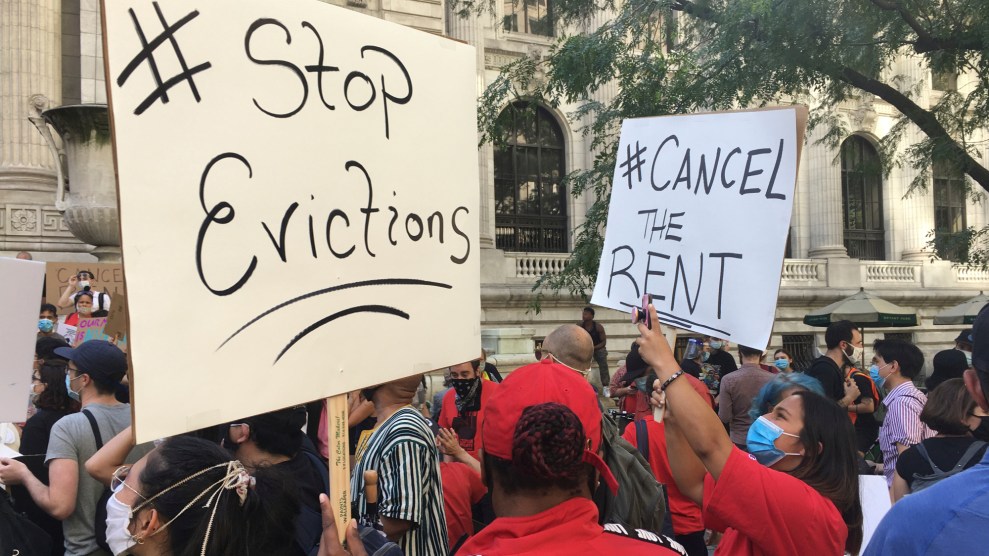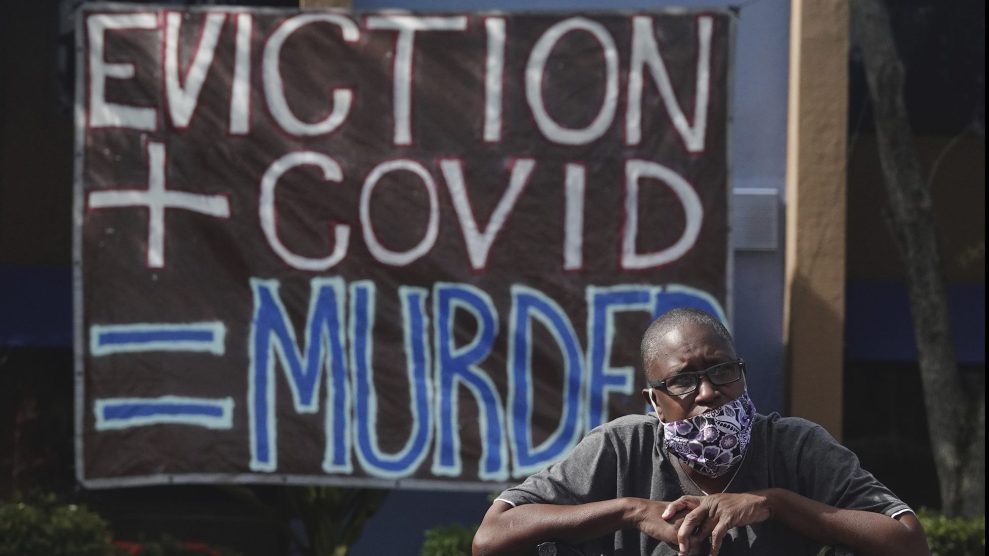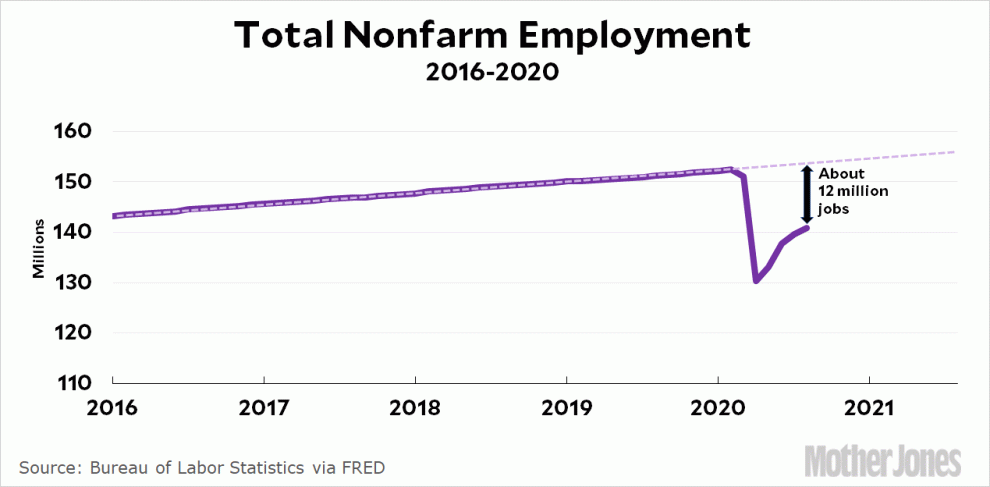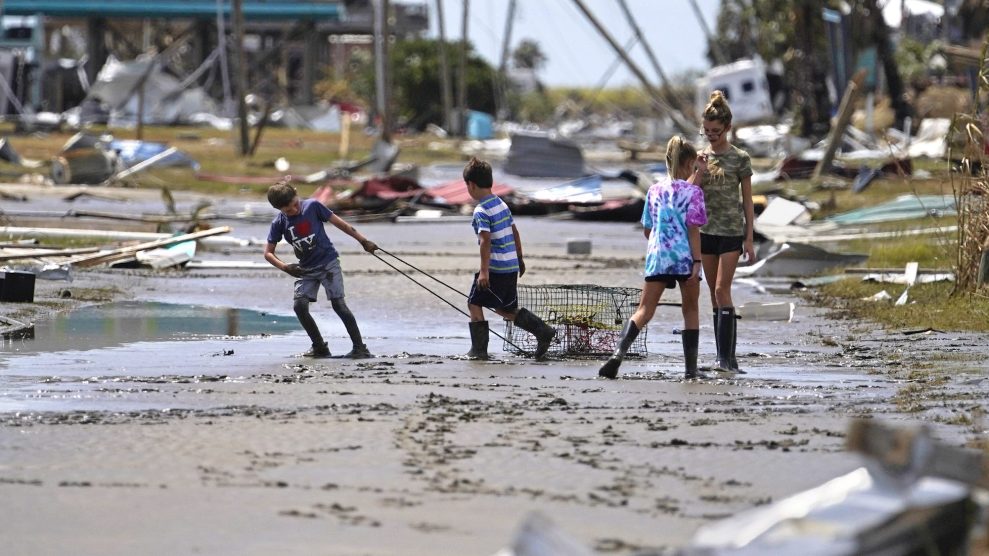
STRF/STAR MAX/IPx/AP
This piece was originally published by the Center for Public Integrity, a nonprofit, nonpartisan investigative news organization in Washington, D.C.
Update: Dec. 9, 2:15 p.m.: The Center for Public Integrity has received a copy of the framework of the Emergency COVID Relief Act of 2020, which a bipartisan group of senators is drafting. The plan calls for extending an eviction moratorium through Jan. 31; the current moratorium ends Dec. 31. The framework also calls for providing $25 billion in rental assistance, though it is unlikely the money would reach renters by Jan. 31.
A nationwide ban on evictions is the only thing standing between millions of jobless Americans and homelessness—and it’s set to expire Dec. 31, weeks before President-Elect Joe Biden takes the oath of office.
Donald Trump’s administration could extend the moratorium on evictions in his final days in office, the lame duck Congress could pass a bill that temporarily halts evictions, or Biden could issue a new ban after he is sworn in on Jan. 20.
But for millions of Americans who collectively may be as much as $24 billion behind in rent payments to their landlords by January, the ban is only a temporary fix for an impending economic calamity.
Without widespread rent relief for low-income Americans who lost their jobs and had little or no financial buffer before the COVID-19 pandemic hit, landlords everywhere almost certainly will try to force their tenants to move out the moment an eviction moratorium is lifted.
The people most likely to be affected by mass evictions are non-white Americans, the same people who are more likely to die or lose their jobs because of the coronavirus.
The mountain of debt afflicting many Americans is potentially life-altering on an individual level, experts say, and will affect the economy for years to come as the racial wealth gap widens.
“I do think this is a very dangerous moment in terms of the welfare of the American people,” said William A. Darity, the Samuel DuBois Cook Distinguished Professor of Public Policy at Duke University.
Nickaishah Butler, who is Black, lost her job at a Taco Bell in downtown Cleveland when COVID-19 began to spread through the city in March. She applied for unemployment insurance twice but was denied both times because she hadn’t worked at the restaurant long enough.
When the school year was about to start this fall, her landlord threatened to evict Butler and her five children, who were between the ages of 2 and 12. Her oldest child was showing signs of depression and was referred by a doctor to a counselor.
“I can’t catch a break,” said Butler, a single mother. “I don’t know how they expect me to hold up.”
Congress can intervene, but discussions around an additional stimulus package have yet to produce an agreement that everyone supports. A bipartisan group of senators unveiled a $908 billion spending plan recently that would include $25 billion in renter assistance, according to the office of Sen. Joe Manchin III, D-W.Va., but the plan may face resistance from the White House. (A framework of the plan provided to the Center for Public Integrity does not mention extending the eviction moratorium.)
An extra $600 a week in unemployment benefits was phased out at the end of July, and 12 million people are expected to lose their unemployment insurance through a separate program—“the last economic lifeline,” according to a left-leaning think tank—on Dec. 26.
Advocates are optimistic that Biden and his fellow Democrats will be able to pass a bill that includes widespread rental assistance, but it won’t be clear until early January which party will control the Senate, because two seats in Georgia are in a runoff.
By that time it may be too late, unless the Centers for Disease Control and Prevention extends its moratorium on evictions. A spokesperson for the CDC said she could not comment on whether the eviction ban would be extended because of a lawsuit filed by landlords and others who oppose the moratorium.
The decision to extend the moratorium may mean the difference between life and death for some renters. People who lived in states that allowed evictions over the summer were more likely to contract COVID-19 and more likely to die from it, according to researchers at five universities.
Debt piling up
The National Council of State Housing Agencies, a nonprofit advocacy group, commissioned a study to gauge how many people were behind in their rent in the midst of the pandemic.
The picture was “staggering,” said Stockton Williams, the council’s executive director.
By November, renters were estimated to be $17 billion to $18.8 billion behind in payments to their landlords. The consulting firm that prepared the report, STOUT, estimates by January, renters will be up to $24.5 billion behind.
“It’s safe to say that millions of Americans will be suffering from the long-term financial effect of housing instability and owing multiple months of back rent for months and years to come,” Williams said.
Race and ethnicity aren’t part of STOUT’s study, but other reports show Black and brown Americans are far more likely than Whites to be behind in rent.
In November, almost a third of Black renters weren’t able to keep up with rent payments, compared to 16% of Hispanic and Asian renters and 13% of White renters, according to the U.S. Census Bureau’s Pulse survey, which measures financial welfare in the COVID pandemic.
Harvard University’s Joint Center for Housing Studies found that the pandemic widened racial disparities. Black and brown households were already proportionately more cost-burdened by rental payments before COVID-19 struck last winter. By late September, 23% of Black, 20% of Hispanic and 19% of Asian renters were behind on their rents, compared to the 10% share of White renters.
The debt these renters owe to landlords could linger for years, damage debtors’ credit reports and make it more difficult to rent clean, safe housing in the future.
If the eviction moratorium is extended without rental assistance, a key problem will remain, said Anne Kat Alexander, a project leader with Princeton University’s Eviction Lab.
“If you miss a month’s rent or even miss half a month’s rent, housing is so unaffordable that that couple hundred dollars might be impossible for a tenant to make up,” Alexander said.
Darity, the economist from Duke, said the wealth gap is widening, particularly for non-White residents, because the United States has never prioritized the wellbeing of all Americans. Lawmakers have never guaranteed employment, health insurance and housing, nor have they approved of reparations for descendents of slaves.
“To the extent that we’ve never made a social commitment [to basic needs],” Darity said, “we’re going to experience this kind of inequality that’s associated with significant deprivation for a large part of our population.”
Homelessness looms
Months ago, as the coronavirus pandemic began to tear through the country, Congress passed an eviction moratorium in the Coronavirus Aid, Relief, and Economic Security (CARES) Act, signed by President Trump on March 27.
But the ban only protected about a third of the nation’s renters, and landlords continued to file eviction paperwork against their tenants. In July, a Center for Public Integrity analysis of court filings showed that nearly two-thirds of the eviction cases filed during the pandemic were against tenants living in Black and brown communities.
During the pandemic, landlords have filed more than 150,000 eviction cases against tenants in the 25 cities tracked by Princeton University’s Eviction Lab, despite various national, state and local moratoriums.
Sen. Sherrod Brown, D-Ohio, who has led efforts to pass rental assistance in Congress, said a surge of eviction cases will hit courts if the CDC moratorium lifts Dec. 31.
“What kind of country are we that will allow this wave of evictions in the middle of the winter, in the middle of a pandemic?” Brown said in a Nov. 9 call with the National Low Income Housing Coalition. “That’s just morally indefensible.”
In San Diego, which has one of the nation’s highest rent-to-income ratios, attorneys at the Legal Aid Society of San Diego are busy enough fighting cases against landlords trying to work their way around the moratorium. When it lifts, the lawyers expect to be overwhelmed.
“My staff can just see this tsunami pouring over them and they won’t be able to fight the tide back,” said the society’s CEO, Greg Knoll.
One family the society is assisting owes their landlord more than $20,000 because the husband’s income, which he derived from speaking at conferences, dried up when COVID struck. The family was unable to receive a Paycheck Protection Program loan from the government and worries they may be evicted when the moratorium lifts. They have no relatives to live with.
Butler, the mother of five in Cleveland, said her family likely would wind up in a homeless shelter if their landlord evicted them. She said her mother didn’t have enough room in her house to take them in because she was already caring for several other relatives.
Butler is on food stamps but said they don’t go far enough, with her children eating three meals a day at home.
“As soon as my refrigerator is full, between me and my five children, it’s empty by the second week of the month,” Butler said.
Even before COVID-19, student homelessness had reached its highest level in a dozen years, according to federal data. More than 1.5 million children were identified as homeless in the 2017-2018 school year, according to the most recent data from the National Center for Homeless Education, which is funded by the U.S. Department of Education and based at the University of North Carolina at Greensboro.
That was the highest number of homeless students recorded since at least 2005. (The race and ethnicity of homeless students weren’t tracked until the 2019-2020 school year. That data has yet to be reported by the Department of Education.)
If the eviction moratorium lifts without widespread rent relief, the number of students who are considered homeless by the Department of Education—those living on the streets or in shelters, motels or with friends, relatives or others—likely will increase.
“I know it’s cliché to say ‘unprecedented,’ but it’s the truth,” said Barbara Duffield, executive director of SchoolHouse Connection, a nonprofit that monitors student homelessness.
The rising cost of housing, stagnant wages, opioid addiction and natural disasters caused many parents to lose their homes, even before the coronavirus shut down businesses and schools.
Now, millions more families face eviction and foreclosure in the wake of an economic crisis that is arguably worse than the Great Recession.
After the housing bubble burst in 2008, Black and Latino Americans did not regain their financial footing, said Aracely Panameño, director of Latino affairs for the Center for Responsible Lending. As the pandemic stretches on, they face higher infection and death rates and unemployment at far higher numbers than white Americans. Historically, Black women are more likely to be evicted.
During the Great Recession, about 10 million Americans lost their homes to foreclosure. Three to four times that many people face eviction or foreclosure because of the pandemic, according to the National Low Income Housing Coalition.
Almost $4 billion in government funds has been set aside to help renters pay their landlords, the coalition says. But that pales in comparison to the $100 billion it estimates Congress needs to earmark to catch renters up on what they owe.
“This is debt that renters will never be able to afford to pay off,” said Sarah Saadian, the coalition’s vice president of public policy.
Possible relief?
The Democratic-controlled House of Representatives has, in fact, passed legislation that would provide $100 billion in rental assistance, but the bills met with roadblocks in the Republican-controlled Senate.
Biden’s win and the Democrats’ retention of the House may change the dynamic. So far, however, Democrats and Republicans in the lame duck session can’t seem to agree on a funding amount for a new stimulus bill. The results of the January runoffs may determine whether the logjam is broken.
“The Trump-[Sen. Majority Leader Mitch] McConnell view is to say to people, ‘You’re on your own,’” said Brown, the ranking Democratic member on the Senate Banking, Housing and Urban Affairs committee. “People shouldn’t have to fend for themselves without outside assistance in the middle of a once-in-a-generation crisis.”
The White House and McConnell’s office did not respond to requests for comment.
The $1,200 stimulus checks that the federal government sent to eligible Americans after the CARES Act passed are long spent, and rent-relief programs have been inundated with callers.
In Milwaukee, more than 25,000 people called the city’s Social Development Commission in the first two weeks after the organization started a rental assistance program this summer. The call center was overwhelmed, said commission CEO George Hinton, who grew up in poverty.
Before the coronavirus spread through the city, Milwaukee was in economic distress, especially in communities of color, Hinton said. When many low-wage jobs dried up because of the pandemic, those neighborhoods were hit especially hard. Evictions there increased dramatically in the summer, when the initial federal moratorium lapsed, and they are starting to increase again.
Renters around the country are struggling, as are the landlords to whom they owe several months’ worth of rent, said Greg Brown, senior vice president of government affairs for the National Apartment Association. The association, which represents more than 82,000 landlords, joined the lawsuit challenging the CDC’s eviction moratorium.
Congress’s failure to act has left millions of Americans on a financial cliff, Brown said in an emailed statement, jeopardizing 40 million apartment homes, 17.5 million jobs and a $3.4 trillion industry. Rental assistance is “the only responsible and sustainable solution,” he said.
















